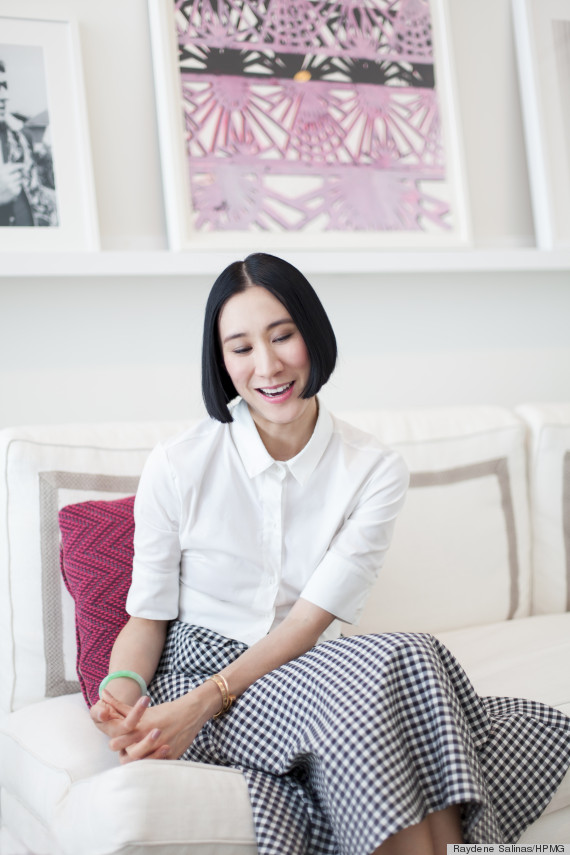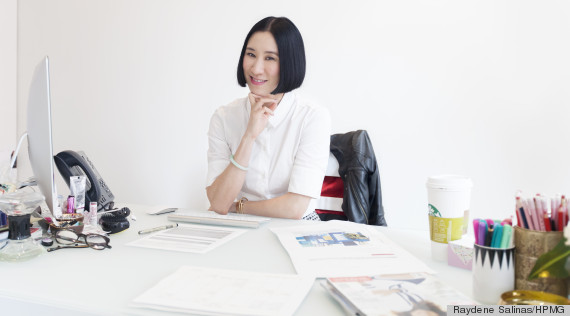"Yes, You Can Make It In Fashion" is a new HuffPost Style series that profiles men and women across every area of the fashion industry and explores how they rose to the top, how they thrive and practical advice they have for young people trying to break into their world.
When you think of the editor-in-chief of one of the most popular fashion magazines in America, you probably don't think of someone who makes you laugh, drops "Jerry Maguire" references and is obsessed with khakis and scrunchies. But such is the case with Eva Chen, the editor-in-chief of Lucky Magazine.
So how did she get there? Chen was born and raised in Greenwich Village, New York City "before it was filled with celebrities and Alec Baldwin punching people," and found her path to fashion domination in an unlikely way. The editrix was a pre-med student in college and worked as a paralegal for a couple of months after graduation, but she eventually decided on a career in publishing even though her paralegal salary far exceeded that of even a senior editor. With over a decade of experience working for magazines, including stints at Elle and Teen Vogue, Chen is one of the few editors who effectively bridges the gap between print and digital, embodying what it means to be a 21st-century editor -- she's the rare print mag editor with over 188,000 Instagram followers.
Lucky for us, we got to sit down with one of the most influential players in fashion right now and pick her brain on what NEVER to wear to a fashion interview and the one thing you can do to set yourself apart when you're gunning for a job.

On whether or not you need to go to journalism school to be an editor:
You do not need to go to journalism school if you want to work in the fashion industry. I think high schools condition you to think this way: If you want to be a fashion editor, go to fashion school. If you want to be a writer, you should study journalism. I think that the best school in life is experience. I think that practice makes perfect and I can say that even now, as someone who has been writing and editing professionally for about a decade. It has taken me 10 years to solidly define my voice and solidly feel secure in what I am doing, and that is a testament to practice.
I get asked that all the time -- I do informational interviews, usually one or two a week, and one of the top questions I get from young people, and young writers especially, is, "How do I find my voice?" You find your voice by writing and you find your voice by reading a lot, and I feel like that has definitely been the case for me. My advice for young people is, study what you love and intern in what you want to do. And I think it's okay to pivot as many times as you need to.
On what to wear to an interview in the fashion industry:
You should not wear a suit to an interview. That is all. Period [laughs]. No, you should not wear a suit to a fashion magazine interview unless you are interviewing; even on the corporate side or the business side, a cute blazer is totally great. It's tricky interviewing to work at a fashion magazine or in the fashion industry, because I think it can go two ways: People can either dress very corporately and wear a suit and look totally wrong, but sometimes I see people who think they're interviewing to be a designer or to be on the runway, and they'll wear a crazy outfit. I'm looking for someone who shows their personal style, who looks comfortable in their own skin, who looks professional. But it is very personal. I always say to people, "You know that outfit that when you walked down the street, you were like, 'I'm really into my outfit today'? Wear that."
On what NOT to include on a resume:
I'm not looking for a picture of yourself. I'm not looking for hand-calligraphed kind of stuff. I'm not looking for anything handwritten. I'm looking for... you know when you watch ESPN (I don't actually watch ESPN), but for a few months there was a countdown to the Super Bowl, and I would see all the football players with their stats sheets? That's what I'm looking for. It's your highlights reel of what you've done. It can be work with campus organizations or it can be internships, but I want it to be straightforward things you've done.
On how to wow 'em with your cover letter:
What I look for in a cover letter is personality and not a regurgitation of what's on your resume. That's a mistake that a lot of people will make, where they will send in a resume and a cover letter and the cover letter will read: "First, I interned here..." I can see that in your resume -- what I'm looking for in your cover letter is that you have to convince me that you want to work at Lucky. Who are the photographers that we started working with that you love? Who are your favorite bloggers that you've seen in the magazine? What are the brands that you've discovered in Lucky that you hadn't heard of before? I want someone to show me that they are really and truly an enthusiast of the magazine and culture we perpetrate here at Lucky.
On the importance of two thank you notes:
Back in my day, it would be just be a handwritten [thank you note] that I would hand-deliver to the messenger center the morning after, so by noon, there would be a handwritten note on the person's desk. Nowadays, we move at the speed of light so I imagine you would do an e-mail [right after the interview] thanking someone, clarifying your passion and touching on something that you talked about that excites you about the position.
A handwritten note is still nice, but it can go in the mail now that you're doing an e-mail as well. That's just me, though -- I'm weirdly old school about stuff. The veteran generation of people in the magazine industry bemoan young people and their kind of lack of social skills -- "Oh, they're so entitled, they don't know how to write, they only think in Instagrams..." I think that the road map for success for a lot of young people today is understanding and operating in a world that's not operated by your peer group -- so being old school and new school at the same time.

On the most common mistake newbies make in the workplace:
It's a delicate balance of being proactive and inquisitive and involved, but it's a fine line because you don't want to be a pushy and entitled kid. That's where common sense comes in. It's harder in this day and age. It's probably different with me because I present such an open book on social media, where I am like, "Here is me with six cartons of ice cream," and I think that people feel... a "connection" sounds very serious, but they feel like they know me [and] sometimes people will almost be too familiar. This happens in informational interviews, when it gets a little too familiar -- I could still hire you, and if you're treating me like I'm your 21-year-old best friend, that is not going to get me to hire you.
On the most important quality in an employee:
A good attitude is really important. And a sense of optimism, someone who has ideas and isn't afraid to pitch them no matter what level she is. Someone who is proactive. Someone with efficiency and common sense. They don't always go hand-in-hand, common sense and, well, everything else. And someone who is able to multitask. I think that in this world today, and especially in fashion, there are a lot of people who are specialists, who are really good at one thing, and I think nowadays it's great if you're good at many things. And hunger. It's weird to say -- not hunger in the literal sense like "I could really go for a Rice Krispies treat right now..." (which I could) but hunger to keep learning and growing. And someone who does not stir fill-in-the-blank-bad-word up.
On the future of print magazines in a digital age:
Print is very important because I think there is nothing like the tactile sense of picking up a magazine. You tear things out -- it's called a tear sheet for a reason. There is technology that we have at Lucky where you can take a picture of something with a digital watermark that then takes you to a link where you can buy it right away. American woman do not use that technology. In Korea and in China and in Japan, NFC technology and QR codes are basically how you function. You go to 7-Eleven in Korea and you scan something and you buy it, instantly. So I think that there is a disconnect between what people say that they want -- "Oh, we want something that is digital, 360, etc." and what they actually like. So I think that we are catching up.
I think it will be trickier, to be completely honest, for news magazines and tabloids. Because by the time you hear about some celebrity scandal, you read about it 600 ways on Twitter. And by the time you get the print magazine one week later, you're like, this is old news... Alec Baldwin has punched seven people since then. The way I want fashion to embrace digital more is I want to make the experience of shopping print to shopping in a store more seamless. Right now, if you're on Luckymag.com or, say, Fashionista.com and you say, "Oh, I love this thing," you can click to buy it, whereas it's not that seamless with print.
This interview has been edited and condensed.
